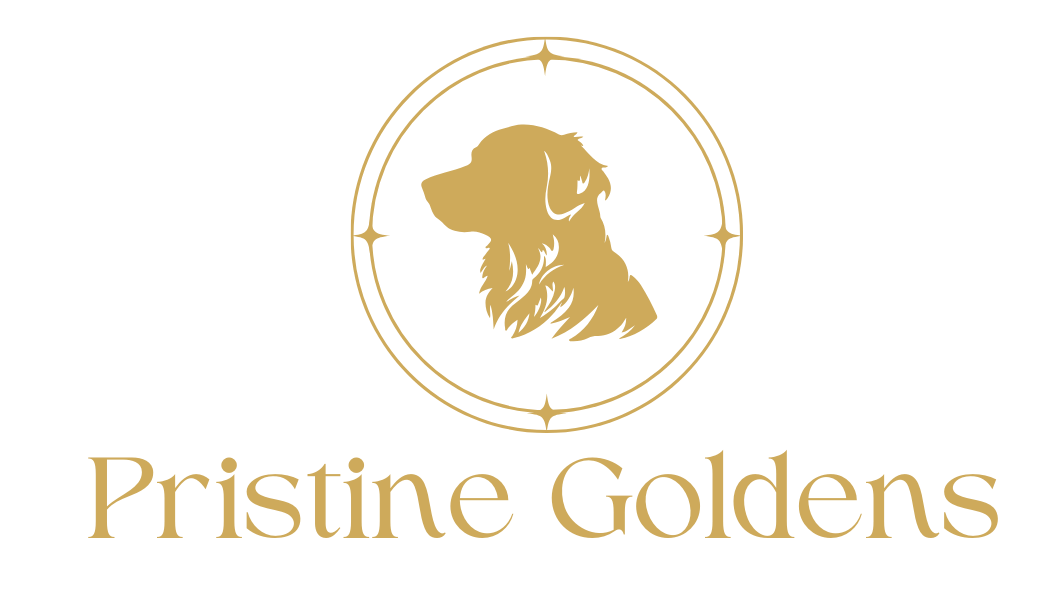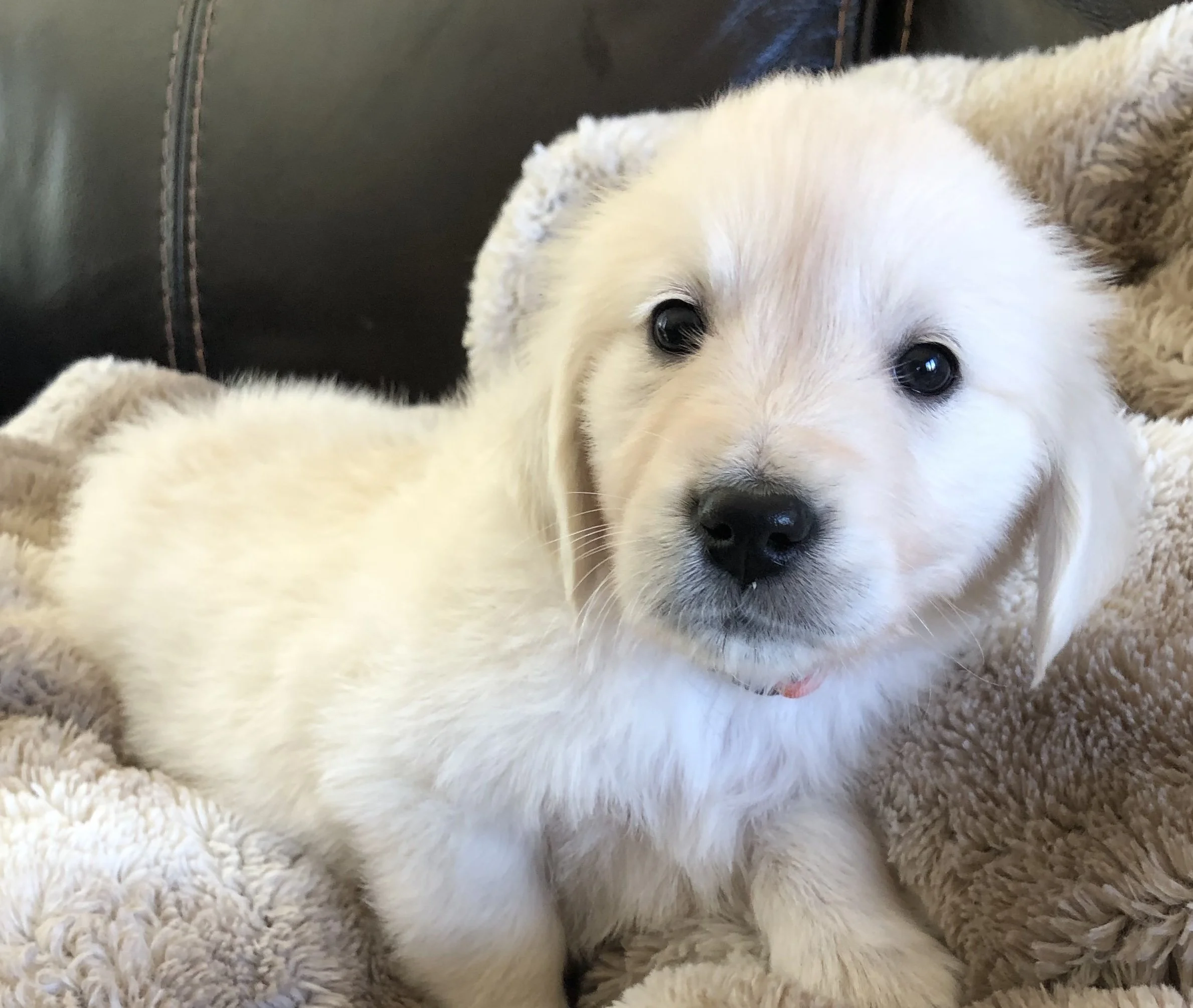New Puppy Checklist
New Puppy Checklist
Prepare for your pup.The most important thing to do is prepare for your puppy BEFORE you bring it home. Everything is new to your puppy. He just left his siblings, Mother and people that he loved, everything smells different, his name has changed and so on. Decide where you want his safe place, and put all his "stuff" in it.
Puppy-proof your house and yard. A great checklist on the AKC website is linked here (click here)
-
Golden Retrievers, being den animals, require a secure space to retreat to during bustling household moments—similar to how humans seek solace in their rooms at times. Enhance their comfort by placing a blanket or bed inside their safe space. Opt for a crate of appropriate size; we recommend 48" crates with a divider for our Golden Retrievers. When the puppies are small, use the divider to match their size, preventing them from using one end for sleeping and the other for elimination. Dogs typically avoid soiling their sleeping and eating areas. We keep the crate doors open, allowing our dogs to decide when to enter or exit. However, if your puppy isn't yet trained, consider keeping them confined until trust is established.
-
Puppies undergo rapid growth, and as a result, collars may become tight. Regularly check to ensure the collar still fits well after a growth spurt, providing comfort and safety for your growing pup.
-
To train your puppy to walk beside you, avoid purchasing a retractable leash. Opting for a four-foot leash provides enhanced control during training, while a six-foot leash offers a more comfortable length for both you and your puppy
-
To address our dogs' tendency to gobble their food, we employ strategies such as turning their bowls upside down and feeding them from the underside. Alternatively, we utilize slow-feeding dishes to promote a more measured and controlled eating pace.
-
Providing a couple of comfortable dog beds in the main rooms of the house allows your dogs to relax with the family. To maintain cleanliness, I use garbage bags around the inside of the beds. This allows for easy unzipping, changing of the garbage bag, and washing of the cover, effectively reducing any potential odors from the beds.
-
When selecting dog food, aim for high-quality options with healthy ingredients. Personally, we use Royal Canin dog food. In my experience of caring for dogs for over 20 years, one way to gauge the quality of dog food (though not proven) is by observing the amount of waste your dog expels. A smaller amount of waste may indicate that more nutrients are being effectively utilized by your dog.
-
When embarking on training sessions, having treats is essential. Opt for higher quality treats for better results. Exercise caution with dog treats from China, as some may contain ingredients that can be harmful to dogs. Additionally, making your own dog treats can be a fun and rewarding option. I've included a few recipes in the blog section of this site for you to explore.
-
For walks, it's essential to have poop bags. Being a responsible pet owner includes cleaning up after your dog. Neglecting this responsibility can strain relations with your neighbors, and it may lead to ground pollution with worms and diseases, creating an unhealthy environment for both your pet and the community.
-
Keeping your dog entertained is important, especially since they can become mischievous and chew on things when bored. When selecting toys, exercise caution to prevent easy tearing and swallowing. Based on past experiences, I no longer purchase plush toys due to the risk of emergency foreign objects surgeries. Instead, I opt for heavy-duty plastic Kong toys, which we fill with yogurt and freeze. This not only keeps them occupied for hours but also adds an element of mental stimulation..
-
Are vaccines really necessary for my puppy? Click here for advice from the AKC
Make sure your vet de-worms your puppies, especially if you go to dog parks or take your dogs on walks where other dogs go
-
Guide to Welcoming Your New Golden Retriever Puppy:
Bringing home a new Golden Retriever puppy involves an adjustment period, laying the foundation for a calm and happy life. Here are some tips for a smooth transition:
Make Time for Your Puppy:
Bring your puppy home at the start of the weekend to provide ample time for adjustment.
Recognize that the initial weeks are stressful for your puppy, and they need your presence.
Name Your Puppy:
Decide on a name for your puppy at six weeks. We will use the remaining time (before you bring him home) to familiarize him with it.
Ensure everyone in your family uses the agreed-upon name to avoid confusion.
Understand Your Puppy's Needs:
Help your puppy adapt to new surroundings by explaining to children the importance of giving them time to rest.
Recognize that puppies sleep 18-20 hours a day, and naps are essential.
Be a Leader:
Establish yourself as the pack leader by simple actions like walking through doors ahead of your puppy and eating before feeding them.
This ensures your puppy understands your family's leadership.
Puppy Feeding Tips:
If transitioning from Royal Canin, provide a gradual switch, and maintain a feeding routine.
If your puppy dislikes new food, consider mixing it with water or broth.
Be Fair:
Avoid hitting your puppy and focus on positive reinforcement for desired behaviors.
Ensure consistent commands and rules among all family members.
Begin Socializing:
Start in-home socialization early and, once fully vaccinated, expose your puppy to new environments.
Exercise caution in places with multiple dogs until vaccinations are complete.
Visit the Vet:
Schedule a vet appointment within 24 hours of bringing your puppy home, bringing along health information and shot records.
Introduce to Existing Pets:
Introduce your new puppy to existing pets in a controlled setting to prevent territorial issues.
Calming Music:
Play calming music, such as from Relaxmydog.com, to reduce stress during significant changes or events.
Feeding Transition:
Gradually switch to Royal Canin Adult food at 8 months to support healthy growth.
Consider NuVet vitamins for an extra boost, and maintain records for an extended health guarantee.
Ensure a smooth integration by being patient, consistent, and attentive to your new puppy's needs.
The following is how we feed our pups:
A few tips No table scraps
Stick to one brand of dog food, continually changing brands is hard on your puppy's digestion
.
Pre-birth - Prior to conception we change the Mom's food to one specially formulated by Royal Canin to ready Mom's body for pregnancy.
After birth - The Mom is fed Royal Canin Mother and Baby food until the puppies are weaned.
Week 1-3 The puppies are fed Mothers milk
Week 3-6 Mother and puppies are fed Royal Canin/ Mother and baby food (free feeding)
Week 7-12 Mother and puppies are Royal Canin / Puppy food - 3 times per day until 12 weeks old
12 weeks old - we drop 1 feeding (2 feedings per day) but increase the amount of food.
15 months old - we change to Royal Canin Adult food. We continue feeding them twice a day, increasing their food as they grow.
Pups should be well-bodied (but not fat) and not too thin.
We will be sending enough food home with your puppy for a few days. If you decide not to use Royal Canin, then mix a little of your puppy food of choice with the food we provide until all of the provided food is gone. When puppies change their diet they can get diarrhea. If this happens mix a little rice with their food for a few days.


